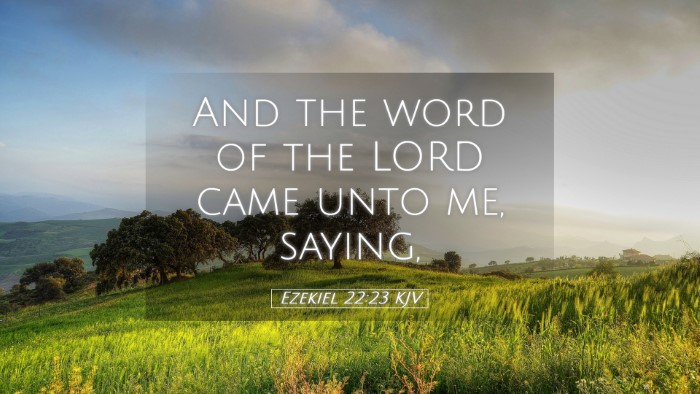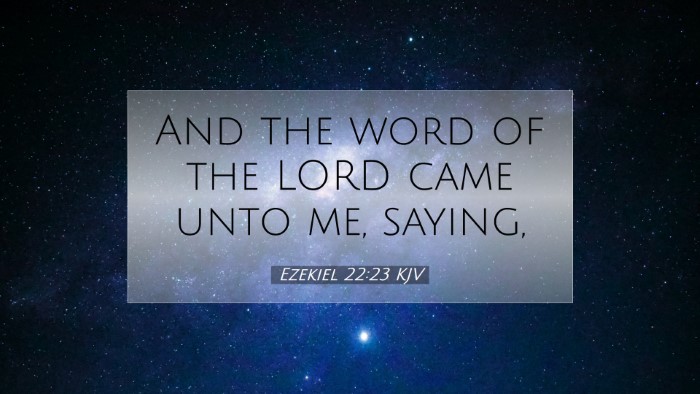Ezekiel 22:23 - Commentary Summary
Verse Text: "And the word of the LORD came unto me, saying," as covered in Ezekiel 22:23 provides a stark revelation about the state of Jerusalem, revealing the moral and spiritual decay of the people.
Introduction
The book of Ezekiel, often regarded as a prophetic work of profound importance, serves as a warning to Israel regarding the consequences of sin and the need for true repentance. In Ezekiel 22:23, God emphasizes His discontent with the people's behavior and their failure to adhere to His commands.
Contextual Overview
This verse is situated within a broader discourse of God’s judgment upon Jerusalem. Ezekiel, the prophet of exile, speaks not merely to convey divine verdicts but to alert the people to spiritual and moral failures. Here, God articulates the need for purification amidst rampant wickedness.
- Historical Background: The context of Ezekiel's prophecies is the Babylonian exile, where the visible absence of God's presence led to despair and disillusionment among the Israelites.
- Literary Style: The use of metaphors, symbols, and direct speech showcases God’s intimacy with His people, coupled with His righteous indignation toward their sins.
Commentary Insights
Various public domain commentaries offer depth to this verse, illuminating the divine message it contains.
Matthew Henry
Matthew Henry emphasizes that this verse highlights God’s omniscient awareness of the community's corruption. He notes:
- Communal Responsibility: Henry asserts that the sins of the individual contribute to the collective downfall, warning that God judges communities as a whole.
- Call to Conscience: He points out how God’s message is meant to awaken the conscience of His people, urging them to self-examine and abandon their sinful ways.
Albert Barnes
Albert Barnes addresses the prophetic implications of this pronouncement. He observes:
- The Role of the Prophet: Barnes explains that Ezekiel functions as a watchman, tasked with revealing both judgment and grace, a dual role essential for leading the people back to God.
- Promise of Restoration: Importantly, Barnes posits that divine retribution comes with the possibility of redemption, suggesting a glimmer of hope for national restoration.
Adam Clarke
Adam Clarke expounds on the imagery of purification, highlighting that:
- Refining Fire: Clarke draws parallels to metallurgical processes, suggesting that just as metals are refined, so too will God purify His people through trials.
- God’s Desire for Purity: He remarks that God’s holiness necessitates a response, imploring believers to pursue righteousness and integrity in their lives.
Theological Reflections
This verse invites profound theological reflection regarding God’s nature as both just and merciful.
- Justice and Judgment: The emphasis on God’s awareness of sin underscores His role as a righteous judge, where no wrongdoing escapes His gaze.
- Mercy and Redemption: Simultaneously, the call for repentance embodies God’s desire for reconciliation and purity, demonstrating that His ultimate goal is restoration.
Application for Today’s Believers
For modern-day pastors, students, and scholars, Ezekiel 22:23 serves as a poignant reminder of the Church's communal and individual responsibility to uphold God’s standards.
- Self-Examination: Believers are encouraged to engage in introspection regarding their spiritual walk, ensuring that their lives reflect the values of the Kingdom.
- Advocacy for Righteousness: This passage calls believers to be voices for righteousness in a world marred by sin, embodying the prophetic spirit that challenges moral decay.
Conclusion
Ezekiel 22:23 encapsulates a timeless truth that remains relevant: God's call for integrity and righteousness! This call not only concerns ancient Israel but resonates deeply within the hearts of believers today. The insights derived from revered commentaries empower the Church to embrace purity and advocate for justice, ultimately fostering a deeper relationship with God.


